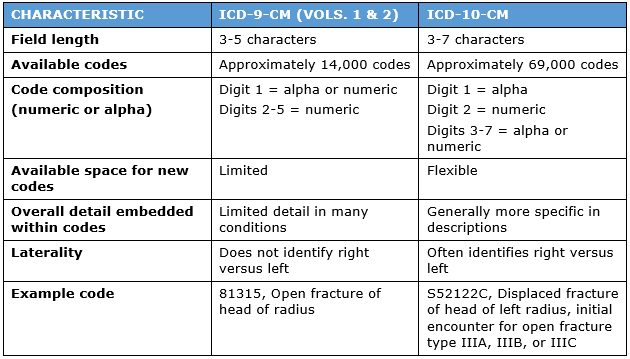How differences between ICD-9 and ICD-10 affect specialty practices
By: Nextech | September 19th, 2014


The differences between ICD-9 and ICD-10 stem from the aims of the newer coding standard. Of particular interest to specialty practices, ICD-10 will much more adequately and accurately describe care and will serve much better for reimbursement purposes, for which ICD-9 was never intended. For ICD-10 to deliver these advantages, it must offer a much larger number of codes. ICD-9’s smaller format restricted its code capacity, which had simply hit its limit.
That’s why ICD-9 is being retired on October 1, 2015, in the transition to ICD-10, which affects coding for patients covered by any health insurance, not just Medicare or Medicaid. Specialty practices with insurance reimbursements need to focus only on ICD-10-CM, which is for all diagnosis coding, and can ignore hospital inpatient coding’s ICD-10-PCS.
The differences between ICD-9-CM and ICD-10-CM are as follows (from the CMS ICD-10 Implementation Guide for Small and Medium Practices):

Of these differences, it’s the dramatic increase in number of codes that poses the greatest transition challenge. Of the 14,000 ICD-9-CM codes:
- Approximately one-fourth match ICD-10-CM codes exactly;
- Nearly half map 1-to-1 but with slightly different diagnosis text; and
- Nearly one quarter are unmapped.
An EMR that helps to automate the transition can take advantage of mapping characteristics to simplify the move to ICD-10, intelligently translating codes for the first two groups that comprise nearly 75 percent of ICD-9 codes and assisting with the remaining unmapped group by suggesting best matches.
Nextech is fully prepared, well ahead of the October 2015 ICD-10 transition, to assist its clients in these and additional ways to minimize disruption. Learn more about how Nextech is making the ICD-10 transition as seamless as possible.
HERE ARE SOME RELATED ARTICLES YOU MAY FIND INTERESTING
Regulatory & Compliance | Revenue & Finances
What Is PECOS? Step-by-Step Guidance for Specialty Practice Owners
By: Nextech | January 5th, 2026
MedSpa | Regulatory & Compliance | Aesthetics
IV Therapy Laws by State
By: Nextech | April 10th, 2025
MedSpa | Regulatory & Compliance | Aesthetics | podcast
The Current & Future State of the Medical Spa Business with Alex Thiersch
By: Tyler Terry | April 24th, 2024